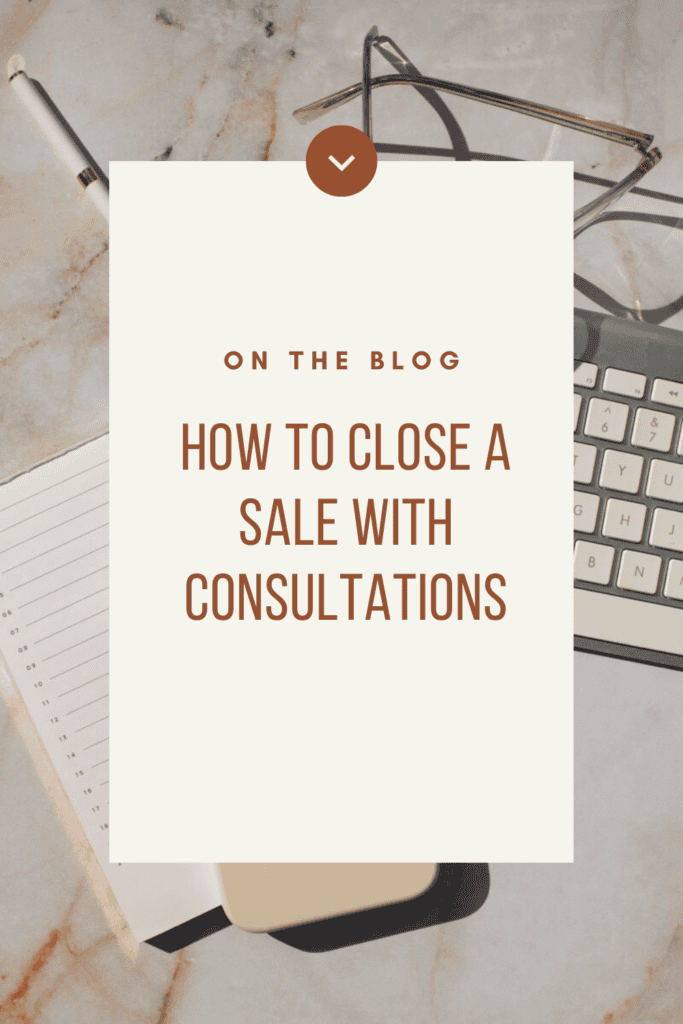If you’re a business owner, you understand that selling is both an art and a science. It requires finesse, strategic thinking, and the ability to connect with potential clients on a personal level. One of the most effective ways to close a sale is through consultations. These one-on-one interactions provide an opportunity to understand the customer’s needs, address their concerns, and ultimately guide them toward making a purchase. In this blog post, we’ll discuss how to close a sale with consultations and offering actionable tips and strategies for success.
Understanding the Power of Consultations
Consultations are a pivotal point in the sales process. They offer an opportunity for establishing rapport, uncovering customer pain points, and presenting tailored solutions. Consultations identify the customer’s needs and desires and foster the know, like, and trust factor. By engaging in meaningful conversation and actively listening to the client, you can gather valuable insights that help you convert an inquiry to a client.
Building Rapport and Establishing Trust
The foundation of any successful consultation lies in building rapport and establishing trust. From the moment the interaction begins, it’s essential to create a welcoming and understanding environment. Start by introducing yourself and expressing genuine interest in the client’s needs. Ask open-ended questions to encourage them to share their concerns, struggles, and objectives. By demonstrating empathy and actively listening to their responses, you can establish a strong rapport that allows you to create a connection.
Uncovering Pain Points
Effective consultations rely on the ability to identify and understand the client’s needs. It’s crucial to ask probing questions that dive into their pain points, goals, and challenges. Listen attentively to their responses, taking note of any recurring themes or specific goals. This deep dive into the client’s needs allows you to tailor your solutions accordingly, positioning your product or service as the ideal solution to their problems.

Offering Solutions
Once you gain a clear understanding of the client’s needs, it’s time to offer the solutions that address their specific pain points. Highlight the features and benefits of your product or service in a way that resonates with the client’s objectives. Use real-life examples, case studies, or testimonials to illustrate how you can help them solve a problem or create a transformation. Demonstrate how what you’re offering can solve their challenges effectively. By aligning your solutions with the customer’s needs, you position yourself as a trusted expert rather than a sleazy salesperson.
Handling Objections With Confidence
Inevitably, objections may arise during the consultation process. Whether it’s concerns about pricing, competition, or implementation, it’s crucial to address these objections with confidence and expertise. Listen attentively to the customer’s concerns, acknowledging their perspective before offering a thoughtful response. Provide additional information, data, or testimonials to alleviate their doubts and reinforce the value of your offering. By addressing objections head-on and showcasing your expertise, you instill confidence in the customer and pave the way for a successful close.
Guiding the Customer Toward a Decision
As the consultation progresses, it’s important to gauge the client’s level of interest and readiness to make a decision. Use guided prompts to assess if they’re ready to move forward, asking questions such as, “Does this solution align with your objectives?” or “Can you see how our product/service would address your needs?” By engaging in this dialogue, you can guide the client toward a decision, allowing them to make the decision and not feel pressured.
Closing the Deal
When the time is right, it’s time to close the deal with confidence and professionalism. Summarize the key points discussed during the consultation, emphasizing how your offering meets the customer’s needs and addresses their pain points. Use assumptive language to guide the customer toward a positive outcome, such as “Based on our discussion, it seems like this is just what you need. Are you ready to move forward?” By positioning the close as a natural progression of the conversation, you make it easier for the client to say yes.
Following Up and Ensuring Customer Satisfaction
Closing the deal is just the beginning of the client experience. After the sale is finalized, it’s essential to follow up with the client to ensure their satisfaction and address any post-purchase concerns. Express gratitude for their business, and reinforce your commitment to their success. By providing exceptional post-sale support and maintaining open lines of communication, you solidify your relationship with the client and ensure client satisfaction.
Closing a sale through consultations requires a balance of empathy, expertise, and strategic thinking. By prioritizing the client’s needs, actively listening to their concerns, and presenting tailored solutions, professionals can guide clients toward a positive purchasing decision. Through effective communication, confidence, and a customer-centric approach, consultations become powerful tools for closing deals and fostering long-term relationships. Mastering the art of sales through consultations opens the door to endless opportunities for success and growth.
SAMPLE SCRIPT
Introduction:
Speaker (Life Coach): Hello, [Client’s Name]. Thank you for taking the time to meet with me today. My name is [Your Name], and I’m a certified life coach specializing in [NICHE].
Building Rapport:
Speaker (Life Coach): [Client’s Name], I’d like to start by getting to know you a little better. Can you tell me a bit about yourself, your background, and what brings you here today? Understanding where you’re currently at and where you want to be will help me best support you.
Exploring Client’s Goals:
Speaker (Life Coach): Thank you for sharing, [Client’s Name]. It sounds like you’re navigating some exciting opportunities and challenges. Let’s talk about how we can help you achieve your goals and aspirations. What specific areas of your life do you feel could benefit from coaching support? Whether it’s career advancement, personal growth, or improving relationships, I’m here to help you define and achieve your objectives.
Identifying Pain Points:
Speaker (Life Coach): I appreciate your openness, [Client’s Name]. It’s clear that you’re motivated to make positive changes in your life. As we explore your goals further, I’d like to understand any obstacles or challenges you’re currently facing. What recurring patterns or limiting beliefs do you feel are holding you back from reaching your full potential?
Presenting Coaching Approach:
Speaker (Life Coach): Based on what we just talked about, I believe I can offer valuable support in overcoming these challenges and achieving your goals. My coaching approach is centered around empowerment, accountability, and actionable steps. Together, we’ll work collaboratively to identify your strengths, challenge your limiting beliefs, and create a roadmap for success.
Highlighting Coaching Benefits:
Speaker (Life Coach): [Client’s Name], I want to emphasize the transformative benefits of life coaching. Through our partnership, you’ll gain clarity on your goals, develop a deeper understanding of yourself, and build the confidence to take bold actions toward your aspirations. Additionally, you’ll receive ongoing support, guidance, and accountability to stay on track and achieve lasting results.
Addressing Client Questions:
Speaker (Life Coach): Before we proceed, do you have any questions or concerns about the coaching process? I want to ensure that you feel fully informed and comfortable with our approach moving forward.
Setting Expectations:
Speaker (Life Coach): It’s important to set clear expectations for our coaching relationship. Our sessions will be confidential, non-judgmental, and focused entirely on your growth and development. I’ll provide personalized guidance, tools, and exercises to support your journey, and I encourage open communication and feedback throughout our time together.
Closing and Next Steps:
Speaker (Life Coach): [Client’s Name], I’m excited about the opportunity to support you on your path to personal growth and fulfillment. If you feel comfortable, I’d love to invite you to take the next step and begin our coaching journey together. We can discuss scheduling, pricing, and any additional questions you may have. Ultimately, my goal is to empower you to thrive in every aspect of your life. What are your thoughts?













